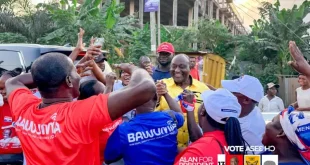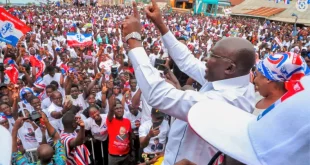In an unofficial speech to his foreign allies, the deposed president of Gabon, Ali Bongo, acknowledged that a coup had been carried out in his nation.
In a 51-second video posted on social media, Bongo is shown in a room in the presidential palace pleading with his friends to’make noise’ against his detention, which happened after the military declared his departure in the early hours of Wednesday, August 30.
He also acknowledged that he is alone at the White House because his wife and children are both being held somewhere else.
“My name is Ali Bongo Ondimba, president of Gabon. I am sending a message to all the friends of all the friends that we have all over the world, to tell them to make noise, to make noise.
“The people here have arrested me and my family, my son is somewhere, my wife is in another place and I am at the residence. Nothing is happening. I don’t know what is going on.
“So I am telling you to make noise, to make noise, to make noise really. Thank you,” his address read.
Minutes after the Central African state’s election board reported that President Ali Bongo had won a third term, military officials in oil-producing Gabon claimed to have taken control and placed him under house arrest on Wednesday.
After a tense poll that was expected to continue the Bongo family’s more than 50-year rule, the officers, who claimed to speak for the armed forces, proclaimed on television that the election results were nullified, borders were blocked, and state institutions were disbanded.
Brice Oligui Nguema, who was purportedly one of the officers in the video, is said to be their leader. The general, together with other generals, will meet on Wednesday to pick who would be in charge of the transitional administration.
Hundreds of people cheered the military’s action in the streets of Libreville, the capital of Gabon, while the African Union and France, the country that once colonized Gabon and still has troops stationed there, denounced the coup.
If the Gabon revolution were to succeed, it would be the seventh to occur in West and Central Africa since 2020. The most recent occurred in July in Niger. Additionally, military officials have taken over in Mali, Guinea, Burkina Faso, and Chad, undoing democratic achievements made since the 1990s and instilling alarm among international countries with strategic interests in the area.
“I am marching today because I am joyful. After almost 60 years, the Bongos are out of power,” said Jules Lebigui, a jobless 27-year-old who joined crowds in Libreville.
After the passing of his father Omar, who had reigned since 1967, Bongo assumed power in 2009. The state’s 2.3 million residents, according to the family’s detractors, have not received their fair part of the oil and mining wealth.
After Bongo’s contested 2016 election victory, there was violent unrest, and a coup attempt in 2019 was thwarted.
The officers from Gabon claimed to represent The Committee of Transition and the Restoration of Institutions. They claimed that the country was experiencing “a severe institutional, political, economic, and social crisis” and that the vote on August 26 was invalid.
Source: Ghanatodayonline.com
 Ghanatodayonline.com News, Politics, Health, Education & More
Ghanatodayonline.com News, Politics, Health, Education & More



